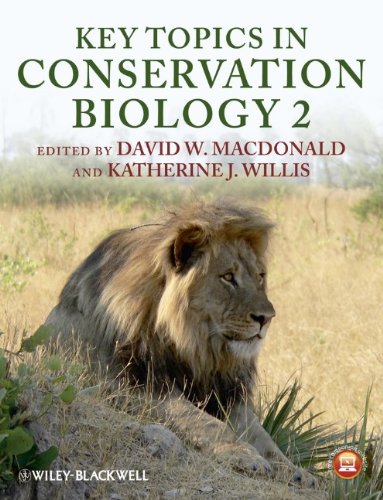

Most ebook files are in PDF format, so you can easily read them using various software such as Foxit Reader or directly on the Google Chrome browser.
Some ebook files are released by publishers in other formats such as .awz, .mobi, .epub, .fb2, etc. You may need to install specific software to read these formats on mobile/PC, such as Calibre.
Please read the tutorial at this link. https://ebooknice.com/page/post?id=faq
We offer FREE conversion to the popular formats you request; however, this may take some time. Therefore, right after payment, please email us, and we will try to provide the service as quickly as possible.
For some exceptional file formats or broken links (if any), please refrain from opening any disputes. Instead, email us first, and we will try to assist within a maximum of 6 hours.
EbookNice Team

Status:
Available4.4
26 reviewsFollowing the much acclaimed success of the first volume ofKey Topics in Conservation Biology, this entirely new secondvolume addresses an innovative array of key topics in contemporaryconservation biology. Written by an internationally renownedteam of authors, Key Topics in Conservation Biology 2 addsto the still topical foundations laid in the first volume(published in 2007) by exploring a further 25 cutting-edge issuesin modern biodiversity conservation, including controversialsubjects such as setting conservation priorities, balancing thefocus on species and ecosystems, and financial mechanisms to valuebiodiversity and pay for its conservation. Other chapters, settingthe framework for conservation, address the sociology andphilosophy of peoples relation with Nature and its impact onhealth, and such challenging practical issues as wildlife trade andconflict between people and carnivores. As a new development, thissecond volume of Key Topics includes chapters on major ecosystems,such as forests, islands and both fresh and marine waters, alongwith case studies of the conservation of major taxa: plants,butterflies, birds and mammals. A further selection of topicsconsider how to safeguard the future through monitoring, reserveplanning, corridors and connectivity, together with approaches toreintroduction and re-wilding, along with managing wildlifedisease. A final chapter, by the editors, synthesises thinking onthe relationship between biodiversity conservation and humandevelopment.
Each topic is explored by a team of top international experts,assembled to bring their own cross-cutting knowledge to apenetrating synthesis of the issues from both theoretical andpractical perspectives.
The interdisciplinary nature of biodiversity conservation isreflected throughout the book. Each essay examines the fundamentalprinciples of the topic, the methodologies involved and, crucially,the human dimension. In this way, Key Topics in ConservationBiology 2, like its sister volume, Key Topics in ConservationBiology, embraces issues from cutting-edge ecological scienceto policy, environmental economics, governance, ethics, and thepractical issues of implementation.
Key Topics in Conservation Biology 2 will, like itssister volume, be a valuable resource in universities and colleges,government departments, and conservation agencies. It is aimedparticularly at senior undergraduate and graduate students inconservation biology and wildlife management and wider ecologicaland environmental subjects, and those taking Masters degrees in anyfield relevant to conservation and the environment. Conservationpractitioners, policy-makers, and the wider general public eager tounderstand more about important environmental issues will also findthis book invaluable.